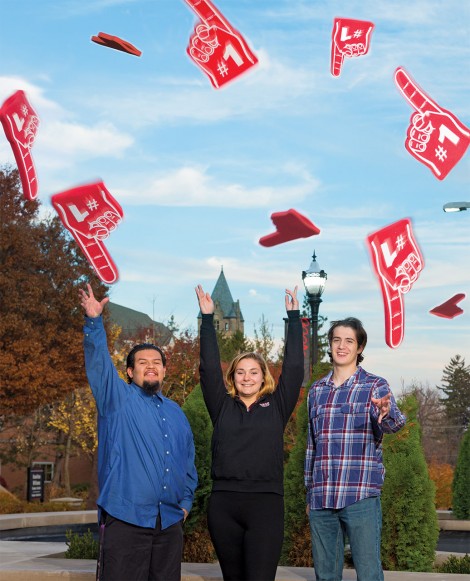
Proud to Be First
First-generation college students at OWU have to tackle more challenges than their peers with different educational, social, and financial backgrounds. But support programs help, and first-gens’ own experiences bring a diverse and broadened richness to the classroom and campus life.
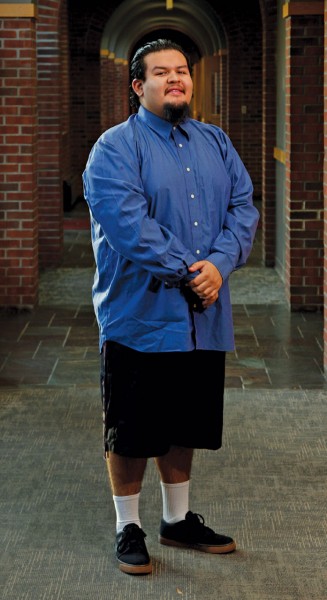
It’s been more than two years since Omar Mendez ’17, a sociology major, first stepped onto the Ohio Wesleyan campus, but he can quickly recall his initial impression of the place.
“The culture of the community was way different from where I came from,” says Mendez, who grew up in South Los Angeles. “The environment was different, too—there are a lot more trees and grass here. Everything is so green.”
Mendez was also a bit green when it came to the college experience. His parents, Jose and Norma, did not attend college. So like other first-generation college students at Ohio Wesleyan, Mendez has had to navigate university life without the benefit of having a parent who could tell him what to expect academically, socially, and financially.
There’s also the pressure of carrying the hopes of parents who view a college education as a privilege and pathway to a better life.
“My whole life,” Mendez says, “my parents told me, ‘Go to college, and you’ll do big things in life.’ It’s a big deal for my family.”
Once on campus, he had to quickly get up to speed with how to manage his time and the freedom of being on his own for the first time. The biggest challenge, though, was wanting to go back home.
“There’s always a push-and-pull factor,” says Mendez. On one hand, he wants to return to inner-city Los Angeles and help young people there—that’s his career goal. On the other hand, he has grown to love Ohio Wesleyan and understand that the opportunities it provides are essential to getting where he wants to go in life.
“Coming here was the greatest decision I’ve ever made,” he says. “I had never envisioned I might be in a school like this. Ohio Wesleyan is for life. It will always have a special place in my heart. Always.”
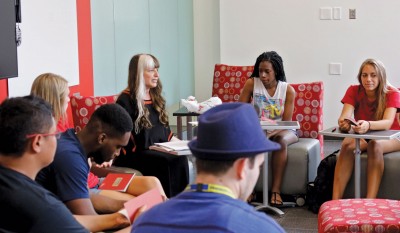
OWU Support Services Address Challenges
Mendez is not alone in being a first-generation college student at OWU. University data show that 18.5 percent of the student body and 25 percent of the current first-year class have identified themselves as first-gen students.
Recognizing the particular challenges facing those students and the responsibility of helping them succeed, OWU offers a number of supportive programs for “first gens,” many through the Office of Multicultural Student Affairs. Another important offering is the First-Generation Experience section of The OWU Experience, a first-year course that helps new students connect to the university.
And like all OWU students, first-generation students can get help from their professors and offices that provide academic advising, financial aid, and residential life services.
“These services really enhance our work with all students but in particular first-generation students,” says President Rock Jones.
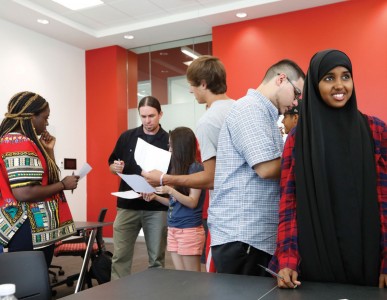
Support for first-gen students is actually part of the OWU DNA. President Jones says one of the principal goals of Ohio Wesleyan founders in 1842 was raising money for scholarships for students of limited financial means who, by and large, were the first in their families to attend college.
“It’s as important today as it was in 1842,” he says, “that we provide opportunities to students from every aspect of life, particularly those whose families have not had the benefit of higher education. These students are often the ones who have the greatest desire to take fullest advantage of what we offer here.”
President Jones also believes the University as a whole has much to gain from its first-generation students. Their experiences and perspectives contribute greatly to building a campus that, in his words, “is diverse in every way.”
“We are best able to prepare students for leadership roles when we give them the opportunity to learn in an environment that is diverse and representative of the full spectrum of the American experience,” he says.
First-generation students often follow different paths to Ohio Wesleyan. For instance, Mendez first heard about OWU at a college fair held at his high school during his senior year and eventually enrolled without ever having set foot on campus.
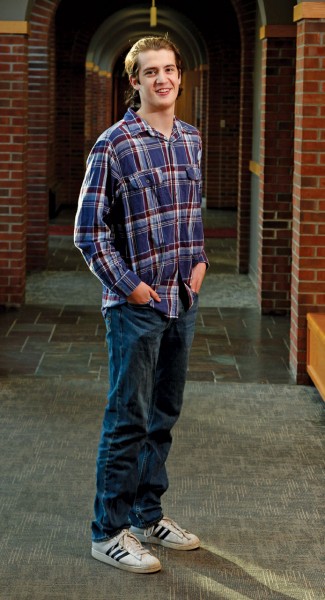
First-gen student Spencer Pauley ’19 wanted to study zoology and had his choice of state schools in Ohio, but decided Ohio Wesleyan would be a better fit. He says its small-town college vibe felt similar to that in his hometown of Oberlin, OH, where Oberlin College is located.
Another first-generation student, Emma Johnson ’19, came from Kennesaw, GA, after hearing about OWU during a college workshop. As a zoology major, she liked that there was an opportunity for her to work at the Columbus Zoo and Aquarium while in school.
For Katie Butt ’15, it was a case of love at first sight during her initial campus visit to Ohio Wesleyan. The native of Upper Sandusky, OH, says there was something about OWU that convinced her it was the right place to continue her education.
Navigating Academic, Social Mazes
Like many first-generation students, however, Butt admits to having felt one step behind at the start of her college experience. She remembers trying to do too much, too fast by taking on a job and joining “way too many” campus groups. Her classwork suffered.
“It was hard for my parents to understand why my grades weren’t as good as they had been in high school,” Butt says. “There were a few classes where I struggled just to get a C, and C’s were never acceptable before college.”
There were also social adjustments due, in part, to her not having the same level of disposable income as some of her classmates. There were times when she had to pass on dinners out with friends, or shopping trips to the mall. Butt also worked 20 hours a week at a campus job to supplement the scholarship and other financial aid that made it possible for her to attend OWU.
So much of who I am today was formed by the connections I made with faculty and staff at Ohio Wesleyan. My professors helped me plan out my classes and figure out my passions. Within the classes, they led some of the most impactful conversations I’ve ever had
Despite the challenges, Butt went on to thrive and graduate with a degree in sociology/anthropology. Today she is an institutional advancement alumni relations officer at Columbus College of Art & Design.
“So much of who I am today was formed by the connections I made with faculty and staff at Ohio Wesleyan,” she says. “My professors helped me plan out my classes and figure out my passions. Within the classes, they led some of the most impactful conversations I’ve ever had.”
Pauley has only been on campus since August, but he’s already discovered that faculty members are eager to help him acclimate to the rigors of OWU course work. That’s important, he says, because although his parents are supportive, they haven’t been able to tell him what to expect in the classroom or socially in college.
“I’m definitely learning on the fly,” Pauley says, “but I also think I’m more motivated to achieve in the classroom and make my parents proud. I’m trying to take advantage of every opportunity here.”
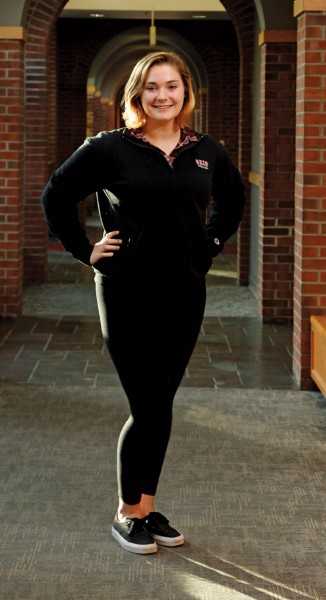
Johnson finds that adjusting to college is a struggle at times, especially when it comes to knowing what she needs to study to be successful in her classes.
“It’s kind of eye-opening,” she says. “I feel as first-generation students, we really don’t know what we’ve gotten ourselves into unlike other kids whose parents went to college.”
Johnson is a member of the First-Generation Experience class taught by Paul Dean, assistant professor of sociology and anthropology. He and Sally Leber, director of service learning, lead separate sections of the class, which is taken by about 30 first-year students.
“I feel like the class gives me a better sense of what I’m going to go through here,” Johnson says. “It’s interesting to learn that although we share that our parents didn’t go to college, we have different backgrounds. It’s very cool to learn about that in class.”
Dean was a first-generation college student—his father was a factory worker and his mother a homemaker—so he can relate to what his students are experiencing.
He recalls that finances drove his decision to enroll at the community college in his hometown of Jamestown, NY, and later at Binghamton University, which is part of the state university system in New York. He went on to earn a master’s degree and doctorate in sociology from the University of Maryland and joined the OWU faculty in 2012.
“I completely bumbled through it—whatever happened, happened,” Dean says of his undergraduate years. “It reflected my very naïve understanding of the process.”
He excelled in his classes at Binghamton but didn’t grasp the value of participating in university activities outside the classroom and the networking, organizational, and leadership skills they foster.
“I just didn’t get it and understand how to go about it,” Dean says, adding that is one of the issues addressed in his First-Generation Experience class. “It’s really important for students to find their group of people. If they don’t have that base of friendship and connection, (college) can be an alienating experience.”
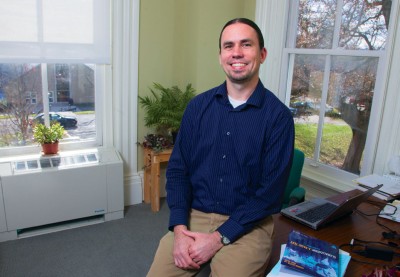
That’s true for all students, but fitting in can be especially challenging for first-generation students. While Ohio Wesleyan offers generous need- and merit-based financial aid packages to make an OWU education possible for deserving students regardless of family income, many first-gens still must hold down jobs to make ends meet. Dean says that cuts into their time for studying and participating in campus groups, activities, and events that contribute to personal growth and complement course work.
“Those are times when students are able to bond, find their place, and be integrated into the university,” Dean says. “It can help them develop a social support system they can lean on when things are really stressful.”
He says first-gen students tend to come from working-class families that may lack experience in dealing with those in authority positions at institutions, including universities. That can hinder them in seeking help from professors and staff members.
“There can be a working class attitude of ‘I didn’t have the advantages, and I’m going to do this myself, dammit,’” Dean says, “while other students feel it’s OK to seek out the people who can help them.”
It is Dean’s hope that his class will help first-gen students understand they are not alone at OWU and can succeed.
 “There’s something really cool about them taking pride that they are here because they’ve worked hard to have the same privilege that other students have,” he says. “They can see that being a first-generation college student is not a big disadvantage or a negative thing, but something they can hold on to and find a social support group that’s gone through similar experiences.”
“There’s something really cool about them taking pride that they are here because they’ve worked hard to have the same privilege that other students have,” he says. “They can see that being a first-generation college student is not a big disadvantage or a negative thing, but something they can hold on to and find a social support group that’s gone through similar experiences.”
Developing Confidence and Pride
Ohio Wesleyan provides a number of programs to help first-generation students and students of color develop confidence and pride inside and outside the classroom, says Terree Stevenson ’95, OWU’s director of multicultural student affairs. They begin with a three-day pre-orientation program at the start of their freshman year and continue through graduation.
Her office helps students with academic planning and offers workshops that include time management, note-taking, study skills, and what to expect in the classroom. There is also a newsletter that provides tips on issues such as effective study habits, goal-setting, and dealing with stress.
Stevenson’s office partners with other campus offices, including alumni relations and career services, on events in which successful alumni and community leaders talk with students of color and first-gens about the challenges they have faced personally and professionally.
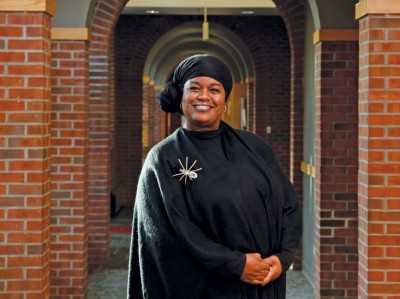
Stevenson, who grew up in inner-city Columbus, can also draw on her experiences as an Ohio Wesleyan undergraduate when talking with students about the challenges and rewards of an OWU education.
One of the challenges, she says, is the pressure of carrying the hopes and dreams of an entire family and even the student’s neighborhood, church, or high school. There are financial issues, and students feeling they have outgrown their family members and friends back home, even if that’s not the case.
But Stevenson is convinced Ohio Wesleyan is a supportive place where a student can clear those hurdles, excel academically, and grow as a person.
“My skills were strengthened at Ohio Wesleyan and by the liberal-arts environment,” she says. “I learned about critical thinking and analysis and how to improve my writing and research skills. It all allowed me to have a great experience inside and outside the classroom and now as a professional and alumna.”
Jeff Bell is a freelance writer in Westerville, OH.
